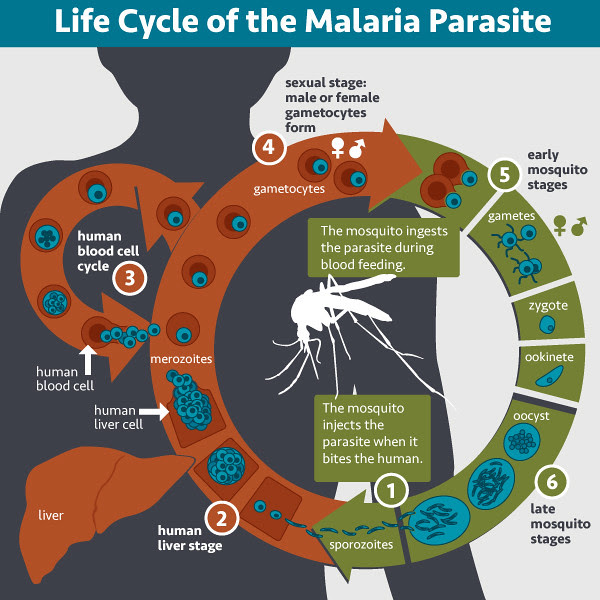
How does malaria affect the human body?
Answer
479.1k+ views
Hint: Malaria is a dangerous tropical disease spread by parasites that can be life-threatening. Every year, it kills around 445,000 individuals worldwide, the majority of them are children in Africa. The Plasmodium parasite causes malaria. Infected mosquitoes can transmit the parasite to humans through bites.
Complete answer:
• Plasmodium parasites, which are carried by anopheles mosquitoes, cause malaria. The malaria parasites are only transferred by female mosquitoes.
• When a mosquito bites a person with malaria, the parasites in the blood are consumed by the mosquito.
• When a mosquito bites another individual, the parasites are transmitted to them. This is how the infection spreads.

• Once inside your body, parasites make their way to your liver, where they multiply. They attack the oxygen-carrying red blood cells in your body. The parasites enter the red blood cell, lay their eggs, and multiply until the cell explodes.
• More parasites enter your bloodstream as a result of this. This infection can make you quite sick as it attacks more of your healthy red blood cells. Malaria is not contagious, which means it cannot be passed from one person to another.
• However, it can be disseminated in the following ways:
> From a pregnant mother to their unborn baby.
> Sharing needles.
> Blood transfusions.
> Organ transplant.
• A person will not have symptoms for one week to one month after being bitten by a mosquito carrying malaria.
• Malaria parasites multiply in a person's liver during this time before infecting red blood cells in the bloodstream.
• The parasites grow and transmit the infection once within a person's red blood cells. Infected red blood cells eventually rupture, causing flu-like symptoms such as sweating, high fevers and chills, as well as nausea.
• The spleen and liver of a patient grow as the disease develops.
• Due to the loss of red blood cells, Malaria can induce Anaemia and Jaundice (yellow skin and eyes). If the infection is not treated quickly, it can lead to kidney failure, seizures, mental confusion, coma, and death.
Note:
• A blood test can detect malaria, but your doctor will also do a physical examination and ask you questions about your medical history and recent travel.
• Your doctor may be able to learn the following from a blood test: If you have the parasite in your blood, Whether or not particular treatments are effective against the parasite if your body has ever produced anti-malaria antibodies.
Complete answer:
• Plasmodium parasites, which are carried by anopheles mosquitoes, cause malaria. The malaria parasites are only transferred by female mosquitoes.
• When a mosquito bites a person with malaria, the parasites in the blood are consumed by the mosquito.
• When a mosquito bites another individual, the parasites are transmitted to them. This is how the infection spreads.

• Once inside your body, parasites make their way to your liver, where they multiply. They attack the oxygen-carrying red blood cells in your body. The parasites enter the red blood cell, lay their eggs, and multiply until the cell explodes.
• More parasites enter your bloodstream as a result of this. This infection can make you quite sick as it attacks more of your healthy red blood cells. Malaria is not contagious, which means it cannot be passed from one person to another.
• However, it can be disseminated in the following ways:
> From a pregnant mother to their unborn baby.
> Sharing needles.
> Blood transfusions.
> Organ transplant.
• A person will not have symptoms for one week to one month after being bitten by a mosquito carrying malaria.
• Malaria parasites multiply in a person's liver during this time before infecting red blood cells in the bloodstream.
• The parasites grow and transmit the infection once within a person's red blood cells. Infected red blood cells eventually rupture, causing flu-like symptoms such as sweating, high fevers and chills, as well as nausea.
• The spleen and liver of a patient grow as the disease develops.
• Due to the loss of red blood cells, Malaria can induce Anaemia and Jaundice (yellow skin and eyes). If the infection is not treated quickly, it can lead to kidney failure, seizures, mental confusion, coma, and death.
Note:
• A blood test can detect malaria, but your doctor will also do a physical examination and ask you questions about your medical history and recent travel.
• Your doctor may be able to learn the following from a blood test: If you have the parasite in your blood, Whether or not particular treatments are effective against the parasite if your body has ever produced anti-malaria antibodies.
Recently Updated Pages
Master Class 12 Economics: Engaging Questions & Answers for Success

Master Class 12 Physics: Engaging Questions & Answers for Success

Master Class 12 English: Engaging Questions & Answers for Success

Master Class 12 Social Science: Engaging Questions & Answers for Success

Master Class 12 Maths: Engaging Questions & Answers for Success

Master Class 12 Business Studies: Engaging Questions & Answers for Success

Trending doubts
Which are the Top 10 Largest Countries of the World?

What are the major means of transport Explain each class 12 social science CBSE

Draw a labelled sketch of the human eye class 12 physics CBSE

Why cannot DNA pass through cell membranes class 12 biology CBSE

Differentiate between insitu conservation and exsitu class 12 biology CBSE

Draw a neat and well labeled diagram of TS of ovary class 12 biology CBSE




